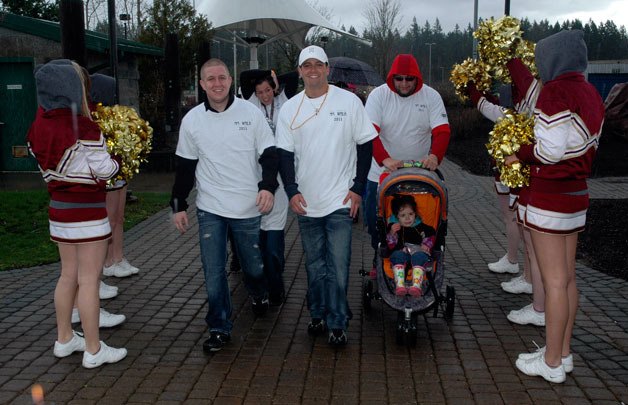TULALIP — Although the morning’s rain brought with it a significantly reduced attendance, the enthusiasm of those who did turn out for the Walk MS at the Tulalip Amphitheatre wasn’t dampened.
Michael Lobaito has been taking part in the three-mile walk fundraiser for the National Multiple Sclerosis Society since it started at Tulalip four years ago, and his “Lobaito Mafia” of family and friends showed up in force, in spite of the unpleasant weather thinning their numbers slightly.
“The first year we did this, we had 58 people on our team,” said Lobaito, who was diagnosed with multiple sclerosis in 2007, the day after he graduated from Arlington High School. “The second year, that went down to about 40, which is the level it’s stayed at since. It’s probably a little less than that this year.”
Lobaito’s biggest shock after being diagnosed was learning that multiple sclerosis is not yet a curable disease, but he quickly adopted an accepting attitude toward his situation.
“The doctor told me I’d be living with it the rest of my life,” Lobaito said. “So I said that I wanted it, and he looked at me like I was crazy. If I have to have it, though, I might as well embrace it.”
Lobaito likewise considers himself fortunate that his symptoms have been limited to fatigue so far. In spite of the gray skies and steady drizzle, he drew energy from crowd that surrounded him.
Not all of the 35 members of “Goochi’s Gang” were able to make it in time for the kickoff of the Tulalip Walk MS at 9:30 a.m. on April 2, but team captain and Marysville resident Gretchen “Goochi” Littell promised a fun after-party for those who had.
“We’re thinking of a nice little get-together with some margaritas,” said Littell, who was diagnosed with MS in January of 2008. “The rain kept a few of our folks from Bellevue and Seattle away, but we’ve still got folks from Everett, Lake Stevens, Bothell and even Gig Harbor on our team who are here.”
“Goochi’s Gang” started with only three members when Littell did her first Walk MS four years ago, and her own awareness of MS has grown by even greater leaps and bounds than the size of her team.
“I’ve since learned that a lot of people I know have MS,” Littell said. “Before I was diagnosed, I had no idea. I only knew one person with MS back then and they were really bad off, so I was terrified. That was before I found out that there are four different types of MS.”
Littell, who described her own MS as “relapsing and remitting,” considers herself relatively lucky.
“I lost the vision in my left eye, but it came back,” Littell said. “I do suffer from fatigue, but it’s not debilitating. I’m just tired all the time. Waking up at 6:30 in the morning to get ready for this walk doesn’t help,” she laughed.
Patty Shepherd-Barnes, president of the MS Society’s Greater Northwest Chapter, conceded that her estimate of 400 walkers at Tulalip on April 2 was less than half of the turnout had been anticipated for this year’s Tulalip Walk MS, but she also noted that this year’s fundraising for the Greater Northwest Chapter as a whole was close to $1.1 million, as opposed to the $1 million that it had raised by this time last year.
“The commitment to the cause has never been so powerful, and the advances in terms of treatments have been exceptional,” Shepherd-Barnes said.







